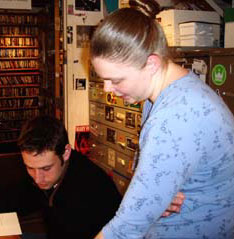(page 2 of 3)
"I do want to probably do some sort of media advocacy, working with independent media: college radio, community radio," she said. "...[m]y primary interest is radio. I've definitely learned a lot of the FCC regulations and why radio stations work the way they do. If I'm working for a smaller, underrepresented non-profit institution, I'll already have an understanding of the basic structure of that environment."
Learning is, in fact, the station's primary purpose. It educates students and community members about music, about promotions, about the way radio works. With eight different departments, including news, music, promotions, production and underwriting (or advertising), there are a wealth of opportunities at KWVA.
"Essentially, we'll take anyone," Nisser said. "We take people who, in a sense, know very little of it when they started and get a sense of how it works from their position here."
KWVA has only a few hiring guidelines.
"We're interested in people who have the goals we have of representing the underrepresented, of putting forward a product, either music-oriented or news-oriented, that isn't found anywhere else," she said. "We really try to put out something people can't hear."
Especially given the increasing corporate control of radio stations under the FCC's relaxation of ownership rules, KWVA is more important than ever in its educational aspect and unique programming, Nisser said.

